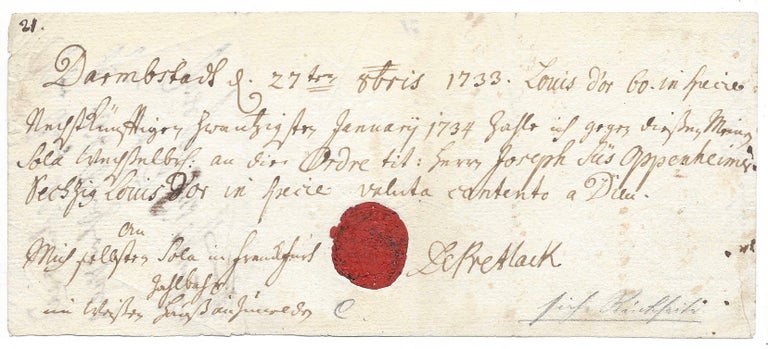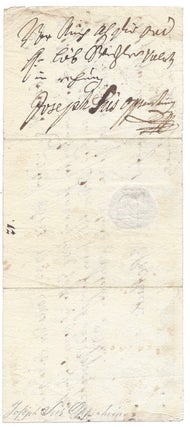Promissory note. (Wechsel.)
Darmstadt: October 27, 1733. With Joseph Süß Oppenheimer’s holograph notes on both sides and signature on verso. Stamped, signed by De Pretlack on recto. One leaf (ca. 205 × 88 mm). In fine condition.
Autograph notes and signature of the Jud Süß, one of the most iconic figures in the history of anti-Semitism (Mintzker, 2017).
Promissory note dated in Darmstadt, Hesse on October 27, 1733, for sixty Louis d’or, to be repaid on January 20, 1734. The contract was made between Joseph Süss Oppenheimer and a member of the Hessian noble family “De Pretlack”, most likely Johann Rudolf Victor Freiherr von Pretlack (1668–1737), General of the Cavalry and Field Marshal Lieutenant. With Oppenheimer’s handwritten notes (partly legible): on the recto the specification of the location in Frankfurt of the repay, and on the verso a signed note, which names Löb Stengler[?], supposedly about the settlement of the loan.
The payee of the sixty Louis d’or, a remarkable amount of money, was Joseph Süß Oppenheimer, better known to history as Jud Süß, the name he was given at the age of twenty-five, while serving as a Hoffaktor, the Court Jew in Mannheim, and used for the remainder of his life.
Oppenheimer was born around 1698 in Heidelberg, the son of a Jewish merchant and tax collector. He succeeded in emancipating himself from Jewish life as a young man, as it was common at the time in German lands (Mann, 2008). Not much is known about his life before entering the service of Karl Alexander, but it is presumed that already at a young age he was employed by the large Jewish commercial houses in Frankfurt am Main, Amsterdam, Prague, and Vienna (JE). He became an agent for promissory note, worked as a jeweler and moneylender, financial advisor, and private banker in Mannheim, and “subsequently he furnished the stamped paper for the court of the Electoral Palatinate [Kurpfalz], and then the coin for Darmstadt” (JE). In 1732, Oppenheimer met with Karl Alexander, the future Duke of Württemberg, then the governor of the Kingdom of Serbia, and became his agent, appointed Court Jew, war factor, and keeper of the regent’s privy purse. When Karl Alexander ascended the throne one year later in December 1733, Oppenheimer continued his service as close confident and helped the Duke to regulate his finances, supply the army, and find new sources of income. By his extensive power and influence, Jud Süß imposed new taxes, established monopolies, and he was given the responsibility for running the mint. He contracted out many valuable financial opportunities to fellow Jews and while serving Karl Alexander successfully, he also made large sums of money for himself. Such acts led to a strong resentment and hostility among the nobility and soon the wider public of Württemberg toward the Duke and his advisor, and when Karl Alexander unexpectedly died in 1737 the Court Jew was immediately arrested. Oppenheimer was put on trial and condemned to death for unsubstantiated accusations, including bribery, treason, and rape. He was hanged in front of a massive audience on February 4, 1738, and his body was locked in a metal cage at the gate of Stuttgart for six years (Mintzker, 2017). His death is now admitted as judicial murder (JE). Oppenheimer’s tragic story was revived by Wilhelm Hauff in 1826, and a hundred years later by Lion Feuchtwanger (1925), whose novel was soon adapted to screen by Lothar Mendes (Jew Süss, 1934). Despite all this, the Court Jew, Joseph Süß Oppenheimer is mainly remembered today through the violently antisemitic propaganda movie, made in Nazi Germany, the Jud Süß, directed by Veit Harlan in 1940.
After his arrest, Oppenheimer’s assets and belongings among them his documents and correspondence were confiscated and prepared systematically by the inquisition commission to be used as evidence against him. The majority of the papers are dated after the present promissory note, and unlike this one, they generally related to Oppenheimer’s relation to Karl Alexander. Today they are kept at the Landesarchiv Baden-Württemberg (Hauptstaatsarchiv Stuttgart, A 48). Handwritten notes by Oppenheimer could be found in the archive of Oppenheimer’s attorney, Michael Andreas Mögling, kept at the Universitätsbibliothek Tübingen (Mh 468). Besides these collections, we could not find any autographs by Oppenheimer in institutional holdings, auction records, or on the market.
Bibl.: Deutsch, G., Kroner, Th.: Joseph Süss Oppenheimer. In: Jewish Encyclopedia (JE). Retrieved from: http://www.jewishencyclopedia.com/articles/11740-oppenheimer-joseph-suss; Mann, V. B.: Images of ‘Jud Süss’ Oppenheimer, an Early Modern Jew. In: Merback, M.: Beyond the Yellow Badge. Anti-Judaism and Antisemitism in Medieval and Early Modern Visual Culture. Leiden: Brill, 2008 pp. 257–274. Mintzker, Y.: The Many Deaths of Jew Süss. The Notorious Trial and Execution of an Eighteenth-Century Court Jew. Princeton: Princeton University Press, 2017.
.
Price: €50,000.00


